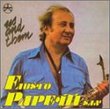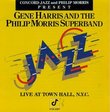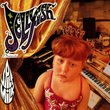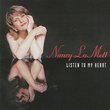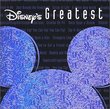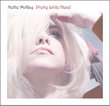| All Artists: Radiohead, Christopher O'Riley Title: Hold Me To This: Christopher O'Riley Plays Radiohead Members Wishing: 1 Total Copies: 0 Label: World Village USA Release Date: 4/12/2005 Album Type: Import Genres: Special Interest, New Age, Pop, Rock, Classical Style: Instrumental Number of Discs: 1 SwapaCD Credits: 1 UPC: 713746803421 |
Search - Radiohead, Christopher O'Riley :: Hold Me To This: Christopher O'Riley Plays Radiohead
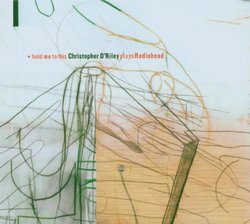 | Radiohead, Christopher O'Riley Hold Me To This: Christopher O'Riley Plays Radiohead Genres: Special Interest, New Age, Pop, Rock, Classical
Tribute albums are always suspect; classical interpretations of rock even more so--and follow-ups to the same are fraught with mediocrity. Just witness the inexplicable glut of String Quartet Tribute discs to Tool, Bruce S... more » |
Larger Image |
CD DetailsSynopsis
Amazon.com Tribute albums are always suspect; classical interpretations of rock even more so--and follow-ups to the same are fraught with mediocrity. Just witness the inexplicable glut of String Quartet Tribute discs to Tool, Bruce Springsteen, and many other top-selling and cult artists. On Hold Me to This, his second run at the music of art-rock group Radiohead, classical pianist Christopher O'Riley avoids all these pitfalls. These aren't easy-listening piano renditions of Radiohead tunes, but deeply inspired, often challenging and dissonant re-imaginings. O'Riley succeeds by taking the music on its own terms. He doesn't try to make it "classical" but lets the classical nature of the music ring out. From the storming chordal overtone clusters of "There There" to the Chopinesque refrain of "The Spinning Plates," O'Riley makes you forget these songs were originally played by a raging rock band. Instead, they seem born on the keys of his piano. His "Paranoid Android" is like Conlon Nancarrow going boogie-woogie one moment and painfully, sweetly rhapsodic the next. I'm not sure how Radiohead fans will respond to this, but piano and classical listeners should rejoice. --John Diliberto Similarly Requested CDs
|
CD ReviewsParanoid fan-droid Alfonso Mangione | Chicago, IL United States | 04/23/2005 (4 out of 5 stars) "You have to give Christopher O'Riley credit. Even though he's already put out an excellent CD of Radiohead piano compositions, there's enough great material in the band's studio albums that he could have easily filled this second disc with crowd-pleasers. And while he did include "Street Spirit" and "No Surprises," he also threw in some surprises, great B-sides like "Polyethylene Part II" and "Gagging Order." That's not the mark of a hustler looking to cash in on one of the best bands making music today--no, it's the mark of a true fan. What's more, O'Riley really understands the band on a primal level, not just as a fan, but as a fellow musician. Radiohead writes unsettling songs, discordant songs about paranoia and dissatisfaction and technophobia, songs about a world that feels wrong on every level. It's no mean feat to play these songs with just a piano instead of a five-man band, but O'Riley pulls it off admirably, playing with passion and verve. His interpretations aren't mechanical tracings of the originals, but they still convey, and even amplify, their feelings--his "Street Spirit" captures the spirit of the original while still sounding new; his "Paranoid Android" sounds even more paranoid than Thom's. At times, the songs feel a touch too discordant, but that's a good thing, in a way--this disc requires multiple listens and is well worth owning, as is O'Riley's first Radiohead disc. It would be nice to hear him play "Optimistic" or "How to Disappear Completely" or "My Iron Lung" or "Just," but that's no knock against the second CD--it's a wishlist for the third." Chris does it again greg s. | Minnetonka, MN United States | 06/06/2005 (5 out of 5 stars) "A great album, just as the first. I am 52, and had bought True Love Waits, because of my respect for O'Riley, as a person, as well as a musician. I had, of course, heard of Radiohead, but did not actually hear any of their music, until I became interested due to O'Riley's transcriptions, created as a labor of love of their music. I now have much of Radiohead's work, and now fully understand why they are so revered. O'Riley's work is an extension/expansion of the original works. Both of which are brilliant, capitivating, haunting, beautiful. Heady stuff, indeed. Hold Me to This, is generally mellower overall, that is, somewhat less notes (thousands instead of millions)are being played concurrently. There are no overdubs, on either recording, which is absolutely amazing. It is great to put both CD's in the player, and hit random. This makes it a bit easier to take in all of the nuance. It takes serious listening to appreciate what is happening, but the payback, is much more than worth it." This is actually a good listen as opposed to... Dave Dickerson | Tennessee | 09/21/2005 (4 out of 5 stars) "Fans of Radiohead will probably be pleasantly surprised at this disc. I feel Christopher O'Riley saw the classical music undertones in Radiohead and felt he could express their music in a new and interesting way. Kudos to him and to this album....
However - do not compare this to the piles of "String Quartet Tributes To..." albums that seem to be popping up for every band under the sun who has sold a million records. They are all put out by a company called Vitamin Records and 98% of them are pure garbage. Vitamin basically hires discount musicians to CRANK OUT one string quartet tribute after another. AVOID AT ALL COSTS. But - for a truly original work and a fitting tribute give this Christopher O'Riley disc at least a preview listen." |

 Track Listings (14) - Disc #1
Track Listings (14) - Disc #1